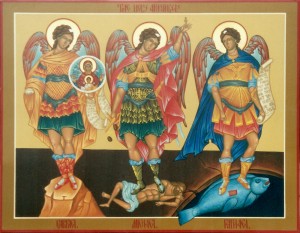 Today is the Feast of the Archangels, specifically Sts. Michael, Gabriel, and Raphael, whose proper names are divinely revealed in the Sacred Scriptures. Happy Feast!
Today is the Feast of the Archangels, specifically Sts. Michael, Gabriel, and Raphael, whose proper names are divinely revealed in the Sacred Scriptures. Happy Feast!
Angels are beautiful. They are “spiritual, non-corporeal beings” whose existence is “a truth of faith” (CCC #328). They “have intelligence and will: they are personal and immortal creatures, surpassing in perfection all visible creatures, as the splendor of their glory bears witness” (CCC #330; Dan 10:9-12).
Furthermore, St. Augustine says: “‘Angel’ is the name of their office, not of their nature. If you seek the name of their nature, it is ‘spirit’; if you seek the name of their office, it is ‘angel’: from what they are, ‘spirit’, from what they do, ‘angel.’” In other words, an angel is a spirit who exercises the office or task as God’s messenger.
But what makes an archangel distinguished from an angel? Why are certain angels “arch”-angels? Pope St. Gregory the Great, in accordance with Augustine’s definition of “angel”, explains this about the archangels in today’s Office of Readings:
You should be aware that the word “angel” denotes a function rather than a nature. Those holy spirits of heaven have indeed always been spirits. They can only be called angels when they deliver some message. Moreover, those who deliver messages of lesser importance are called angels; and those who proclaim messages of supreme importance are called archangels.
And so it was that not merely an angel but the archangel Gabriel was sent to the Virgin Mary. It was only fitting that the highest angel should come to announce the greatest of all messages.
Some angels are given proper names to denote the service they are empowered to perform. In that holy city, where perfect knowledge flows from the vision of almighty God, those who have no names may easily be known. But personal names are assigned to some, not because they could not be known without them, but rather to denote their ministry when they came among us. Thus, Michael means “Who is like God”; Gabriel is “the Strength of God”; and Raphael is “God’s Remedy.”
Whenever some act of wondrous power must be performed, Michael is sent, so that his action and his name may make it clear that no one can do what God does by his superior power. So also our ancient foe desired in his pride to be like God, saying: I will ascend into heaven; I will exalt my throne above the stars of heaven; I will be like the Most High. He will be allowed to remain in power until the end of the world when he will be destroyed in the final punishment. Then, he will fight with the archangel Michael, as we are told by John: A battle was fought with Michael the archangel.
So too Gabriel, who is called God’s strength, was sent to Mary. He came to announce the One who appeared as a humble man to quell the cosmic powers. Thus God’s strength announced the coming of the Lord of the heavenly powers, mighty in battle.
Raphael means, as I have said, God’s remedy, for when he touched Tobit’s eyes in order to cure him, he banished the darkness of his blindness. Thus, since he is to heal, he is rightly called God’s remedy.
Archangels are super-important beings. By simply existing and being named, the archangels help reveal to us the otherwise unfathomable reality of the Divine. Contemplating the archangels and their names is a great way to contemplate God, His identity, and His wondrous works among us humans.



